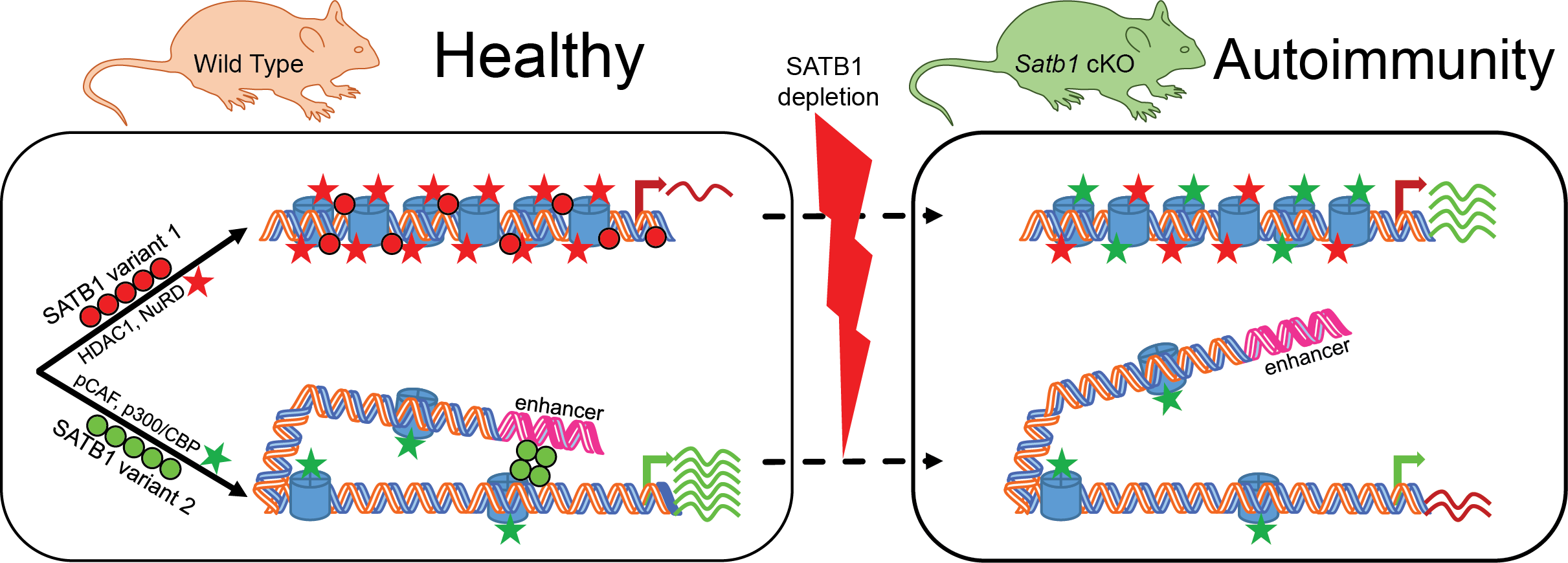All Science News

Can the three-dimensional organization of the T cell genome regulate (auto)immunity?
The research team of Associate Professor Charalampos G. Spilianakis, an affiliated Professor at IMBB-FORTH, worked on answering this question. In this effort, the contribution of the laboratories of Christoforos Nikolaou (Department of Biology, University of Crete, IMBB-FORTH, BSRC Al. Fleming), Sören Franzenburg (Schleswing Holstein University Hospital, Kiel, Germany) and Dariusz Plewczynski (University of Warsaw, Poland) was instrumental.
The research team in Heraklion, Crete, created a T cell-specific knockout mouse that bears a deletion of the Satb1 gene. DNA is not found naked inside our cells but rather interacts with a multitude of proteins that package and regulate it in order to fit inside the nucleus of the eukaryotic cell. The SATB1 protein binds to chromatin and regulates the three-dimensional organization of the T lymphocyte genome. This mouse model exhibits widespread autoimmunity identified by coat and skin problems, inflammation in multiple tissues and lymphoid organs (thymus and spleen).
Utilizing a great number of genomic approaches, including techniques that only the research group in Crete uses nationwide and a few laboratories pan-European, the scientists involved were able to show that the SATB1 protein essentially creates in the three-dimensional space of the T lymphocyte, gene networks that their expression is regulated with enormous precision. Lack of the aforementioned protein, an organizer of the T lymphocyte chromatin, leads to deregulated expression of the immune-specific genes and therefore leads to the induction of extensive inflammation and autoimmunity.
The research team's next step, in the field of autoimmunity research, involves the design of highly specific small molecules to be tested for their ability to inhibit inflammation and autoimmunity, initially in a mouse model and later in humans.

FIGURE: Proposed model on SATB1’s diverse modes of action and how their deregulation may result in a disease. Different variants of SATB1 introduced in Figures 2 can define quite diverse interactomes localized within the cell nucleus. Consequently, different chromatin modifying or remodeling complexes are recruited by different SATB1 variants to the regulated genes. Chromatin accessibility is modified and transcription activation or repression occurs. Moreover, SATB1 mediates long-range promoter-enhancer communication and ultimately regulates chromatin organization. In its absence, the interactome and/or the loopscape structure of the genome is altered resulting in a modified transcriptome. Here we demonstrate how transcription of two genes is controlled either positively or negatively by two distinct SATB1 variants. This transcription state is deregulated in the Satb1 knockout mice, ultimately leading to a disease such as autoimmunity. A link between deregulated SATB1 protein and altered chromatin landscape and/or genome organization in human autoimmune diseases has not been thoroughly studied yet.
The data has been published in the research Journal Nature Communications on November 14 2022:
Zelenka, T., Klonizakis, A., Tsoukatou, D. et al. The 3D enhancer network of the developing T cell genome is shaped by SATB1. Nature Communications 13, 6954 (2022). https://doi.org/10.1038/s41467-022-34345-y
και https://www.nature.com/articles/s41467-022-34345-y.pdf
The members of Charalampos Spilianakis’ laboratory, located at IMBB-FORTH, that participated in the research, include:
- Tomas Zelenka, Marie Currie Fellow at IMBB-FORTH & PhD Candidate, Department of Biology, University of Crete,
- Deppie Tsoukatou, Special Research Assistant at IMBB-FORTH,
- Dionysios-Alexandros Papamatthaiakis, ELIDEK Fellow & PhD Candidate, Department of Biology, University of Crete,
- Petros Tzerpos, PhD Candidate, Department of Biology, University of Crete,
- Ioannis-Raphail Tzonevrakis, Graduate student of the Department of Biology, University of Crete,
- George Papadogkonas, Marie Curie Fellow at IMBB-FORTH & PhD Candidate, Department of Biology, University of Crete,
- Manuela Kapsetaki, Special Research Assistant at IMBB-ITE.
For more information
Charalampos G. Spilianakis
Associate Professor of Molecular Biology & Epigenetics, Department of Biology, University of Crete
Affiliated Professor, IMBB-FORTH
Email: spiliana@imbb.forth.gr
Tel.: 2810-391163








